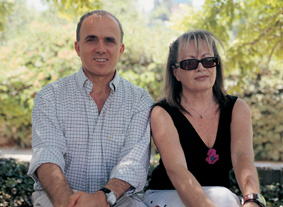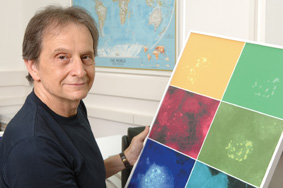When cancer metastasizes, the tumor cells begin to migrate through the bloodstream and establish secondary growth in other organs. Metastasis is the main cause of cancer death, and understanding the mechanisms that make cells detach themselves from their surroundings and migrate may be crucial to developing treatments to prevent or arrest this stage of cancer.
Prof. Yosef Yarden of the Biological Regulation Department led a team of scientists from the Weizmann Institute and the Chaim Sheba Medical Center, as well as Portugal and the U.S., in deciphering a crucial mechanism that controls the first stage of breast cancer metastasis, when the cancer cell first starts to move. This action begins with a signal that comes from outside the cell telling it to prepare for the journey. The signal, called a growth factor, initiates a series of changes in the cell: The cell's internal skeleton comes apart, and the densely packed protein fibers that make up the skeleton unravel to form thin threads that push the cell away from its surroundings.
Yarden, Drs. Menachem Katz, Ido Amit and Ami Citri of the Biological Regulation Department; Tal Shay, a student in the group of Prof. Eytan Domany of the Physics of Complex Systems Department; Prof. Gideon Rechavi of the Sheba Medical Center at Tel Hashomer and others set about investigating the protein changes that growth factor signals bring about. They mapped all of the changes in gene expression that take place once the signal is received.
As they sifted through huge quantities of data, including every protein level that went up or down, the team noticed one family of proteins that stood out. To the scientists' surprise, one member of this family rose dramatically, while another closely related protein dropped off.
Tensins, as these proteins are called, stabilize the cell's internal skeleton. When the team investigated the two proteins, they discovered a significant difference: One of the proteins has two arms, while the other has only one. The two-armed protein – whose level drops in response to the growth factor – stabilizes the cell's structure by grabbing the internal skeleton with one arm and the cell membrane with the other. The one-armed version, in contrast, attaches only to the cell membrane, leaving the protein fibers that make up the skeleton dangling. These unanchored fibers loosen to form the threads that push cells apart. For a cancer cell, this can be the beginning of metastasis.
Further experiments were conducted, both on genetically engineered cells and on tissue samples taken from patients with inflammatory breast cancer (a swift and deadly cancer associated with elevated growth factor activity), as well as on samples from cancer patients who had received a drug that blocks growth factor receptors on cell walls. These studies confirmed the ties between the growth factor signal, the levels of the two proteins, and their direct involvement in metastasis.
Yarden: "The mechanism we identified can predict the development of metastasis and possibly how the cancer will respond to pharmaceutical treatment." This discovery may, in the future, aid in the development of drugs to prevent metastasis in breast or other cancers.
Also participating in this research were Sara Lavi, Nir Ben-Chetrit, Gabi Tarcic, Dr. Moshit Lindzen and Roi Avraham from Yarden's group; Dr. Ninette Amariglio and Dr. Jasmine Jacob-Hirsch from Rechavi's group at Sheba Medical Center; from Portugal, a research team from the Institute of Molecular Pathology and Immunology and the Medical Faculty at Porto University; and from the U.S., Dr. Sarah Bacus and her team at Targeted Molecular Diagnostics (Westmont, Illinois); and researchers from the University of California at Davis, Boston University and GlaxoSmithKline, North Carolina.
Prof. Yosef Yarden's research is supported by the M.D. Moross Institute for Cancer Research; the Goldhirsh Foundation; and Mr. Daniel Falkner, UK. Prof. Yarden is the incumbent of the Harold and Zelda Goldenberg Professorial Chair in Molecular Cell Biology.
Leading the Invasion
Colorectal cancer is one of the most prevalent cancers in the Western world. The tumor starts off as a polyp but turns into an invasive and violent cancer, which often metastasizes to the liver. In an article recently published in the journal Cancer Research, Prof. Avri Ben-Ze'ev and Dr. Nancy Gavert of the Weizmann Institute's Molecular Cell Biology Department reveal mechanisms involved in the spread of this cancer.
In a majority of cases, colorectal cancer is initiated by a key protein – beta-catenin. One of the roles of this protein is to enter the cell nucleus and activate gene expression. In colorectal and other cancers, beta-catenin over-accumulates in the cell and inappropriately activates genes whose expression leads to cancer.
Surprisingly, one of the genes activated by beta-catenin in colorectal cancer cells is a receptor previously detected by Ben-Ze'ev's group called L1-CAM, which is usually found on nerve cells, where it plays a role in nerve cell recognition and motility. What is this receptor doing on cancer cells? Previous research by Ben-Ze'ev showed that L1-CAM is expressed only on some cells located at the invasive front of the tumor tissue, hinting that L1-CAM could be an important player in the development of metastasis.
Using a mouse model for metastasis to check this assumption, the scientists found that colorectal cancer cells engineered to express the L1-CAM gene do indeed spread to the liver, while those cells lacking L1-CAM do not.
In collaboration with Prof. Eytan Domany and research student Michal Sheffer of the Institute's Physics of Complex Systems Department, Ben-Ze'ev then compared the expression of genes induced by L1-CAM in cultured colon cancer cells to those in 170 samples of colorectal cancer tissue removed from patients and in 40 samples of normal colon tissue. Out of about 160 genes induced by L1-CAM, some 60 were highly expressed in the cancerous tissue but not in normal colon tissue. Ben-Ze'ev is conducting further research into the role of this set of genes to unravel the details of L1-CAM's function in metastasis.
Prof. Avri Ben-Ze'ev's research is supported by the Jean-Jacques Brunschwig Fund for the Molecular Genetics of Cancer; Curie–Weizmann; and the Eugene and Delores Zemsky Charitable Foundation Inc. Prof. Ben-Ze'ev is the incumbent of the Samuel Lunenfeld-Reuben Kunin Chair of Genetics.


